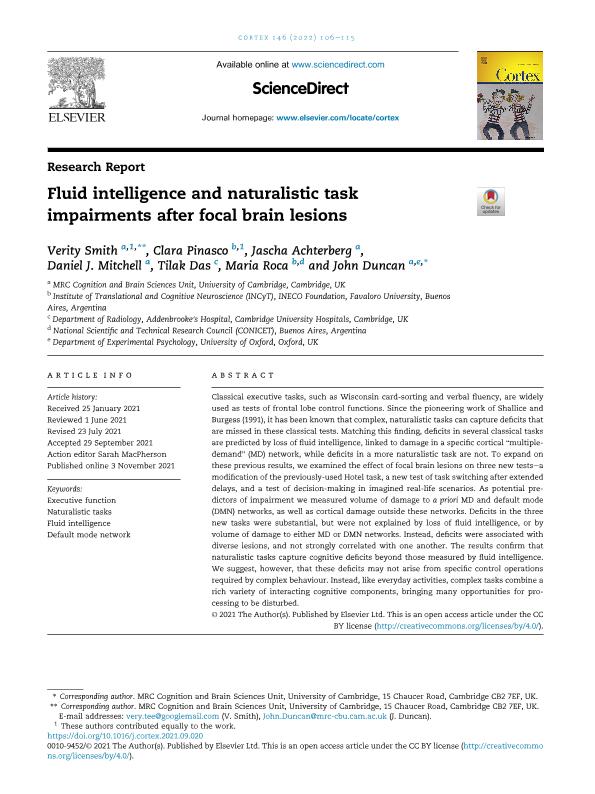Mostrar el registro sencillo del ítem
dc.contributor.author
Smith, Verity
dc.contributor.author
Pinasco, Clara
dc.contributor.author
Achterberg, Jascha
dc.contributor.author
Mitchell, Daniel J.
dc.contributor.author
Das, Tilak
dc.contributor.author
Roca, María

dc.contributor.author
Duncan, John
dc.date.available
2023-10-04T09:44:08Z
dc.date.issued
2022-01
dc.identifier.citation
Smith, Verity; Pinasco, Clara; Achterberg, Jascha; Mitchell, Daniel J.; Das, Tilak; et al.; Fluid intelligence and naturalistic task impairments after focal brain lesions; Elsevier; Cortex; 146; 1-2022; 106-115
dc.identifier.issn
0010-9452
dc.identifier.uri
http://hdl.handle.net/11336/214019
dc.description.abstract
Classical executive tasks, such as Wisconsin card-sorting and verbal fluency, are widely used as tests of frontal lobe control functions. Since the pioneering work of Shallice and Burgess (1991), it has been known that complex, naturalistic tasks can capture deficits that are missed in these classical tests. Matching this finding, deficits in several classical tasks are predicted by loss of fluid intelligence, linked to damage in a specific cortical “multiple-demand” (MD) network, while deficits in a more naturalistic task are not. To expand on these previous results, we examined the effect of focal brain lesions on three new tests–a modification of the previously-used Hotel task, a new test of task switching after extended delays, and a test of decision-making in imagined real-life scenarios. As potential predictors of impairment we measured volume of damage to a priori MD and default mode (DMN) networks, as well as cortical damage outside these networks. Deficits in the three new tasks were substantial, but were not explained by loss of fluid intelligence, or by volume of damage to either MD or DMN networks. Instead, deficits were associated with diverse lesions, and not strongly correlated with one another. The results confirm that naturalistic tasks capture cognitive deficits beyond those measured by fluid intelligence. We suggest, however, that these deficits may not arise from specific control operations required by complex behaviour. Instead, like everyday activities, complex tasks combine a rich variety of interacting cognitive components, bringing many opportunities for processing to be disturbed.
dc.format
application/pdf
dc.language.iso
eng
dc.publisher
Elsevier

dc.rights
info:eu-repo/semantics/openAccess
dc.rights.uri
https://creativecommons.org/licenses/by/2.5/ar/
dc.subject
DEFAULT MODE NETWORK
dc.subject
EXECUTIVE FUNCTION
dc.subject
FLUID INTELLIGENCE
dc.subject
NATURALISTIC TASKS
dc.subject.classification
Psicología especial

dc.subject.classification
Psicología

dc.subject.classification
CIENCIAS SOCIALES

dc.title
Fluid intelligence and naturalistic task impairments after focal brain lesions
dc.type
info:eu-repo/semantics/article
dc.type
info:ar-repo/semantics/artículo
dc.type
info:eu-repo/semantics/publishedVersion
dc.date.updated
2023-08-02T18:00:39Z
dc.journal.volume
146
dc.journal.pagination
106-115
dc.journal.pais
Francia

dc.journal.ciudad
Paris
dc.description.fil
Fil: Smith, Verity. University of Cambridge; Estados Unidos
dc.description.fil
Fil: Pinasco, Clara. Consejo Nacional de Investigaciones Científicas y Técnicas. Oficina de Coordinación Administrativa Houssay. Instituto de Neurociencias Cognitivas y Traslacional; Argentina
dc.description.fil
Fil: Achterberg, Jascha. University of Cambridge; Estados Unidos
dc.description.fil
Fil: Mitchell, Daniel J.. University of Cambridge; Estados Unidos
dc.description.fil
Fil: Das, Tilak. University of Cambridge; Estados Unidos
dc.description.fil
Fil: Roca, María. Consejo Nacional de Investigaciones Científicas y Técnicas. Oficina de Coordinación Administrativa Houssay. Instituto de Neurociencias Cognitivas y Traslacional; Argentina
dc.description.fil
Fil: Duncan, John. University of Cambridge; Estados Unidos. University of Oxford; Reino Unido
dc.journal.title
Cortex

dc.relation.alternativeid
info:eu-repo/semantics/altIdentifier/doi/http://dx.doi.org/10.1016/j.cortex.2021.09.020
Archivos asociados
